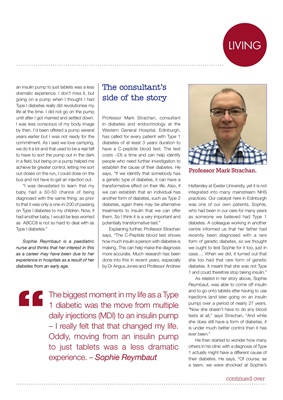
KITLIVING
continued over
an insulin pump to just tablets was a less
dramatic experience. I don't miss it, but
going on a pump when I thought I had
Type I diabetes really did revolutionise my
life at the time. I did not go on the pump
until after I got married and settled down.
I was less conscious of my body image
by then. I'd been offered a pump several
years earlier but I was not ready for the
commitment. As I said we love camping,
we do it a lot and that used to be a real faff
to have to sort the pump out in the dark
in a field, but being on a pump helped me
achieve far greater control, letting me sort
out doses on the run, I could dose on the
bus and not have to get an injection out.
"I was devastated to learn that my
baby had a 50-50 chance of being
diagnosed with the same thing; as prior
to that it was only a one-in-200 of passing
on Type I diabetes to my children. Now, if
had another baby, I would be less worried
as ABCC8 is not so hard to deal with as
Type I diabetes."
Sophie Reymbaut is a paediatric
nurse and thinks that her interest in this
as a career may have been due to her
experience in hospitals as a result of her
diabetes from an early age.
The consultant's
side of the story
Professor Mark Strachan.
Professor Mark Strachan, consultant
in diabetes and endocrinology at the
Western General Hospital, Edinburgh,
has called for every patient with Type 1
diabetes of at least 3 years duration to
have a C-peptide blood test. The test
costs ~£6 a time and can help identify
people who need further investigation to
establish the cause of their diabetes. He
says, "If we identify that somebody has
a genetic type of diabetes, it can have a
transformative effect on their life. Also, if
we can establish that an individual has
another form of diabetes, such as Type 2
diabetes, again there may be alternative
treatments to insulin that we can offer
them. So I think it is a very important and
potentially transformative test."
Explaining further, Professor Strachan
says, "The C-Peptide blood test shows
how much insulin a person with diabetes is
making. This can help make the diagnosis
more accurate. Much research has been
done into this in recent years, especially
by Dr Angus Jones and Professor Andrew
Hattersley at Exeter University, yet it is not
integrated into many mainstream NHS
practices. Our catalyst here in Edinburgh
was one of our own patients, Sophie,
who had been in our care for many years
as someone we believed had Type 1
diabetes. A colleague working in another
centre informed us that her father had
recently been diagnosed with a rare
form of genetic diabetes, so we thought
we ought to test Sophie for it too, just in
case…. When we did, it turned out that
she too had that rare form of genetic
diabetes. It meant that she was not Type
1 and could therefore stop taking insulin."
As related in her story above, Sophie
Reymbaut, was able to come off insulin
and to go onto tablets after having to use
injections (and later going on an insulin
pump) over a period of nearly 27 years.
"Now she doesn't have to do any blood
tests at all," says Strachan, "And while
she does still have a form of diabetes, it
is under much better control than it has
ever been."
He then started to wonder how many
others in his clinic with a diagnosis of Type
1 actually might have a different cause of
their diabetes. He says, "Of course, as
a team, we were shocked at Sophie's
"The biggest moment in my life as a Type
1 diabetic was the move from multiple
daily injections (MDI) to an insulin pump
- I really felt that that change my life.
Oddly, moving from an insulin pump
to just tablets was a less dramatic
experience. - Sophie Reymbaut